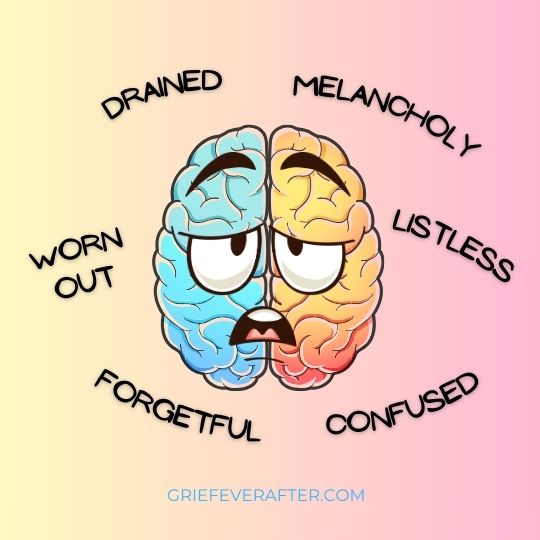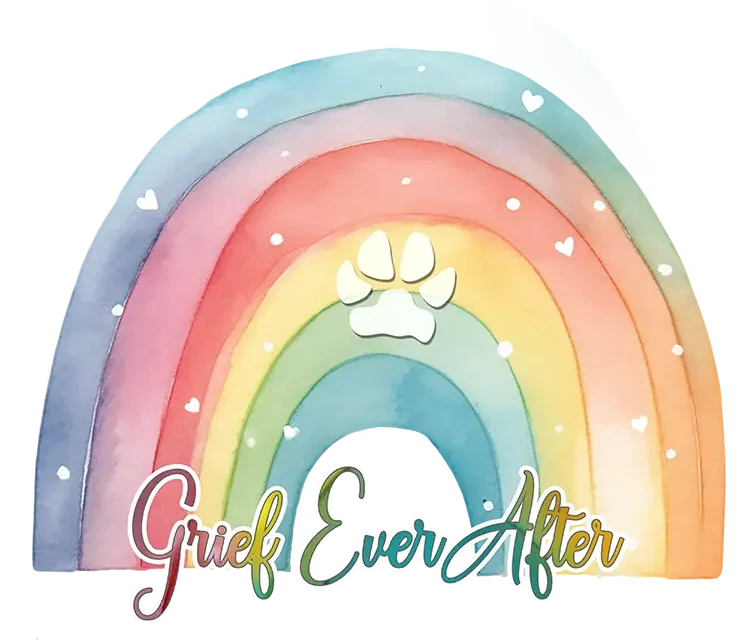Grief Brain, Fatigue, and Apathy After Losing a Pet
When you lose a beloved furry family member, life is upside down and backwards for a while. Your routine changes, your environment changes, your life changes. After losing a pet you may find yourself confronted with some unexpected challenges that accompany grief. Grief brain, fatigue, and apathy just to name a few.
When your life is already in such a huge period of transition, being exhausted with a foggy mind can cause even more imbalance and overwhelm. Along with simply not being able to envision what life will look like now, this constant cycle can breed apathy.
Slowly working on the draining, life-sucking parts of grief can help you start to recognize bits and pieces of yourself again.
Maybe you never heard the term grief brain, but suddenly it all makes sense. Or you might have heard it before but never experienced it until now. Grief brain can make daily life feel disorienting.
Misplacing your keys when you always put them in the same exact spot. Finding the pint of ice cream you were eating the night before in the fridge and not the freezer. Starting the microwave and realizing you never actually put anything in it.
Little annoyances throughout the day can be signs of grief brain. But this fogginess can weasel its way into more important parts of your life. Forgetting appointments, forgetting bills, not functioning well at work, or taking wrong turns while you’re driving could all be signs of grief brain.
Somewhere in the midst of these moments you might think, “Is grief making me crazy?” It’s not. As troubling as this stuff can be, it’s a normal part of grief after losing a pet.
With your brain seemingly both in overdrive and also not working right, fatigue is a common result. Grief is exhausting. Trying to function is exhausting. Crying is exhausting. And not getting the best, most restorative sleep is exhausting.
You can see how the cycle starts and continues. Often, there is a sense of despair in grief wondering how you’ll ever make it over all these hurdles you’re faced with.
Grief + disorientation + exhaustion + sadness = apathy.

Some of the links in this post may be affiliate links. This means that if you click on one of these links and make a purchase, I may earn a small commission at no additional cost to you.
The definition of apathy is the lack of interest, enthusiasm, or concern. That hits the nail on the head. The apathy of grief and life after losing a pet is not something you’re typically prepared for, or know what to do with.
Everyting seems trite or not worth it. The effort even easy things take is too much. Investing in trying to heal seems pointless. That’s apathy rearing it’s head.
Let me reassure you again that this is all normal. The drain and fogginess of grief needs some time to begin to lift. But it does eventually. “When?” is different for everyone.
Wondering if there is anything you can do to help yourself with grief brain? Beyond practicing self-compassion, there may be a few things you can try to get your mind back on a track you recognize.
Keep Lists
For all the reasons you’d imagine, keeping lists can help. Remembering important things. Remembering trivial things. Feeling like you were able to check things off a list is also a motivator and a reminder that you can be productive, even in grief.
Lists can also help you prioritize tasks. Daily non-negotiables at the top and things that are less important at the bottom.
A pocket sized notebook can become a trusted ally while you navigate grief brain.
Try Brain Games
Especially if you’re finding that fogginess and the inability to mentally function like you used to is interfering in your life. Engaging in some brain games can do more than be slightly entertaining. They can help you engage parts of your mind that grief has weighed down.
Memory, critical thinking, creative thinking. Brain games can even offer some distraction.
This could be anything from sudoku, Wordle, a crossword, apps like Lumosity or BrainApps.io. Even a good old fashion puzzle can get your brain going.
Have a Specific Wind Down Routine at Night
Restorative sleep after pet loss sometimes becomes non-existent. Often your pet is such a large part of your nightly routine that you can’t get into a rhythm any more. This can lead to excessive screen time/social media time, tossing and turning, and ruminating thoughts.
Introducing some wind down rituals might not be an immediate help for a good night’s sleep, but with consistency they can become very beneficial.
A few suggestions: Spend five minutes sitting outside, showering before bed, stretching, having a cup of tea, journaling for a set amount of time (e.g. 10 min), listening to an audio book, meditating.
Try things that might be different or new that you can see yourself doing consistently and without tremendous strain or effort.
A wind down routine needs to be just that. A relaxing period that helps your body know that sleep is coming soon.
Take Walks
Walking has so many health benefits in general but after pet loss, it can help you feel just slightly more connected to yourself and to your body.
Walking could be a good way to start the day or even be part of your wind down routine.
I’m not going to gloss over the fact that walking if you had a dog whom you walked regularly can be a really tough practice to get back to in grief.
Maybe this one isn’t for you. But if you want to get back to or continue walking, you can employ a few strategies. You can completely change your walking routine by going a different direction or even getting a walking pad and walking inside.
You can also consider bringing a linking object with you. A toy, collar, tag, or anything that distinctly makes you feel connected to your pet. Sometimes these items can give you a strength you didn’t realize they would, while gently pushing yourself to do something you’ve historically enjoyed.
Meditate
Taking time to clear your mind as much as humanly possible. Find a meditation app (Insight Timer is a good one). Choose a narrator whose voice you find calming and a meditation length that feels doable.
Meditations can be a way to start the day, a way to feel grounded throughout the day (even if it’s in the car or in the restroom at work or school), and could also be a part of the path to a good night’s sleep.
Maybe you’ve never tried meditation before and might seem too “out there” for you right now, but I suggest just trying it. Meditation is not just for spiritual enlightenment. It’s for grounding, feeling in touch with yourself, and centering your mind.
It can’t hurt to try and if it’s still not for you, then you’ll know for sure.
While there is no timeline on grief or coping with the “stuff” grief brings with it, finding effective ways to manage grief brain, exhaustion and apathy will help pave the way for a more direct path to healing through grief after losing a pet.
Tackling grief and mourning with a rested, clear mind and desire to find ways to heal can make a world of difference in your journey.






